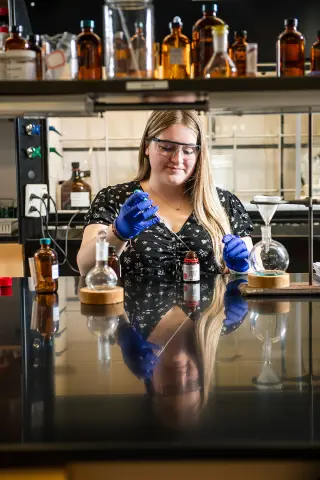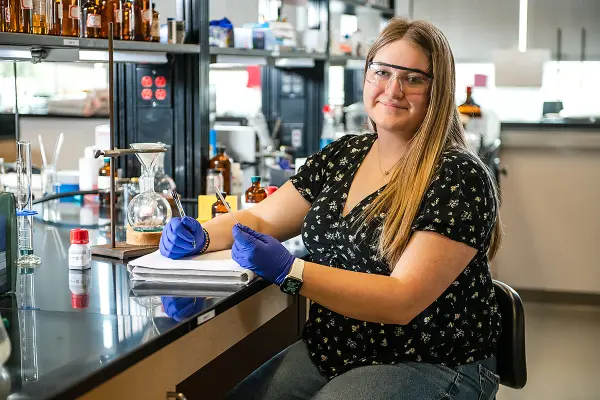
Biochemistry major Melanie Eichler the first AU student to be a Goldwater Scholar
ASHLAND, Ohio – Melanie Eichler, a biochemistry major at Ashland University, has been selected for one of the nation’s preeminent undergraduate awards – a Barry Goldwater Scholarship. The 2025 honorees were recently chosen by the Barry Goldwater Scholarship and Excellence in Education Foundation from an estimated pool of more than 5,000 college sophomores and juniors representing 445 academic institutions.
Eichler is the first AU student to be a Goldwater Scholar, and she was elated when the announcement arrived in her inbox.
“I didn’t expect anything. It was a great process in itself,” Eichler said of the extensive application process. “I got to really reflect on what I’ve done and what I want to do with my degree and my life. So, either way I was content with what happened. (When the) email popped up and it said congratulations, I had to look twice. It was honestly such a crazy moment. I’m grateful for it for so many reasons.”
Eichler’s AU advisor, Nick Johnson, Ph.D., an associate professor of chemistry, wasn’t as surprised upon hearing the news, but was very proud.
“(This is) super exciting because it’s a very prestigious scholarship,” added Johnson. “(Mel’s) been phenomenal throughout her time here … an absolute great student, very productive and just a good person all-around. I thought her application was really strong, but you just never know when it comes to those highly-competitive scholarship pieces.”
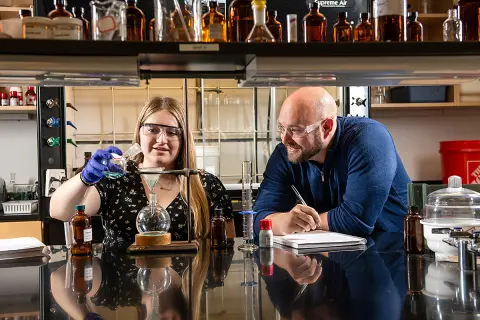
Established in 1986 to honor the five-term Senator from Arizona, the Goldwater Foundation is a federally-endowed agency. The scholarship program was designed to identify, encourage and financially support outstanding undergraduate students interested in pursuing research careers in the sciences, engineering and mathematics.
Each Goldwater Scholar receives a $7,500 award toward academic-related expenses as well as the opportunity to network with former and current Goldwater Scholars.
Eichler, from Mogadore, Ohio, has gained valuable research skills and experience as a member of Johnson’s student lab team over the last two academic years. She will continue to work with him during her senior year, which will include a capstone project as part of being in AU’s Honors Program.
“I really just enjoy the scientific process,” said Eichler. “In the fall of my sophomore year, I started working with Dr. Johnson and he works with drug delivery systems using a lot of inorganic chemistry, a lot of synthesis. I’m still currently in that lab, and I really, really enjoy what we do.”
Since Johnson came to AU in 2015, he began a research project focused on drug delivery systems for anti-cancer drugs. Over the past decade, he has guided dozens of students with a hands-on approach and helped them expand the project via new pathways.
“Every year, we add some new elements and work on some new areas of it. Every student that comes in that has an interest in some area, we try to find a project for them and help them develop their own project as part of it. So, the core of the project has been around, but there’s always some different avenues that we add to it,” he said.
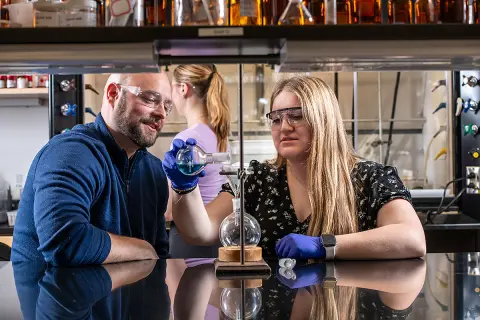
For her senior year, Eichler will work on the fundamental drug delivery system aspect of it, specifically experimenting with a phosphazene ring, and she has a big goal for it.
“We’ve had some issues making it effectively and in large quantities,” she explained. “I’m hoping … I can figure out a reaction to do that effectively, and then if all goes as planned, we could create one optimal drug to send off to test against different cancer screenings. That’s the moonshot. That would be fantastic.”
It is not the cancer-killing drugs themselves that need improved, it’s the drug delivery system, according to Eichler and Johnson.
“When we talk about drug delivery systems, we think about a molecule that has optimal properties that can help that drug move and get to those cancer cells, so we add components that make it hydrophilic (water soluble) so that component helps it move throughout the body. And, we have parts that are lipophilic or fat soluble, and that helps it move in and out of cells. So, it’s adding on to these things that carry it to where it needs to go,” she explained.
Johnson has been impressed by Eichler’s academic talent and attention to detail to the scientific process, but more so by her development as a student researcher and passion to be the best.
“There has been a lot of growth. I think that sets Mel apart from a lot of students,” reflected Johnson. “She said ‘hey, I’m not just solid and I’m talented and I’m going to get through college,’ there was a lot of growth and desire to not just be the best student but to be the best scientist she can be.”
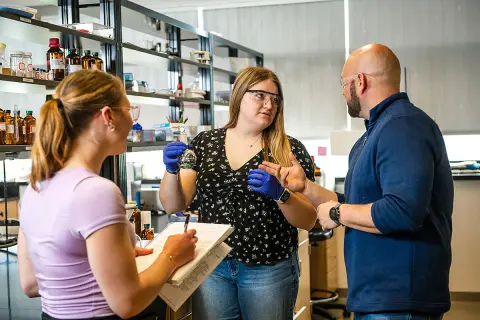
In addition to the opportunity to work on a groundbreaking research project, Eichler has presented at national conferences, such as the American Chemical Society meetings. Another factor that may have helped her become a Goldwater Scholar was the freshman year research she did with Cindy Perkovich, Ph.D., an assistant professor of biology. She collected samples and analyzed photochemical changes in maple trees and nurseries caused by beetles in Tennessee, then presented that research at a 2024 Entomological Society of America conference.
While Eichler decided a career in entomology wasn’t for her, she was grateful for the experience.
“I really liked the methods that we used,” she explained. “I’m sort of unique and I’m very lucky to have experience in two very different research fields … two completely opposite ends of the spectrum.”
With the experiences Ashland has provided, plus this upcoming year as a Goldwater Scholar, Eichler appears well on her way to her career goal of earning a Ph.D.
“Ultimately, I think I’d like to go to grad school and eventually get a Ph.D.,” she said. “Just to be able to truly make a difference, to be impactful on those research teams.”
While Johnson looks forward to seeing how Eichler’s career unfolds, he also expects her to be just the first in a long line of AU students who become Goldwater Scholars.
“(This) is just a testament to the things our students can accomplish here. It’s really impressive, so this is a good thing for Mel because it’s very deserving,” he said. “But, it’s also a testament to the science program here and how we do a good job preparing students and their abilities in research moving forward.”
